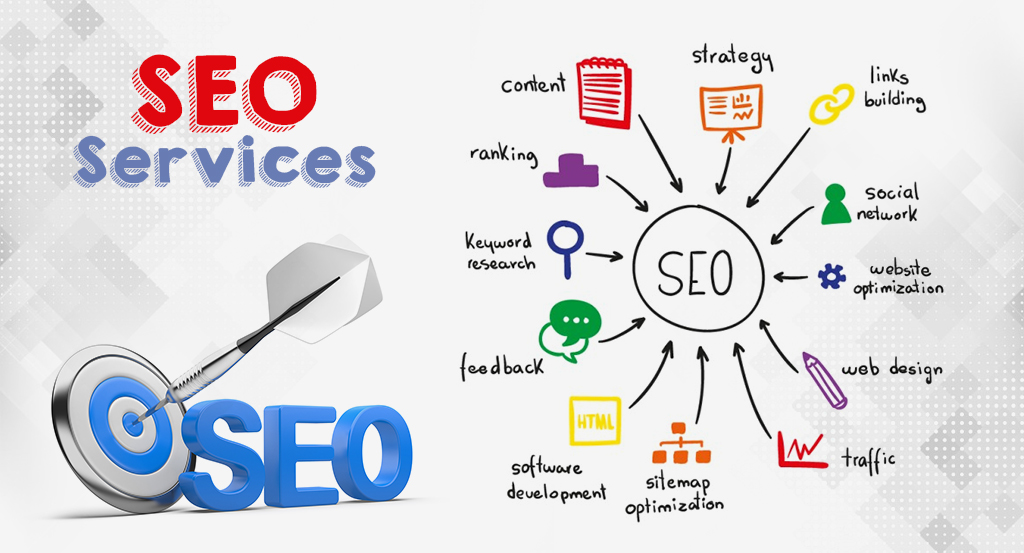The Complexities of Search Engine Optimization: a Deep Study Providers and Techniques From a SEO Expert
The domain of search engine optimization is complex, encompassing a range of services and techniques that require a proficient approach. From fundamental keyword research study to innovative technical strategies, each facet plays an important role in a website's performance - SEO Services London Ontario. A SEO specialist have to browse these intricacies to improve visibility and user experience. Comprehending exactly how these components interconnect can disclose the deepness of SEO's influence on digital presence. What details techniques add most considerably to success?
Understanding the Fundamentals of search engine optimization
Several might view Search engine optimization as a complex area, understanding its essentials is vital for anyone looking to improve on the internet presence. SEO, or Seo, entails a set of strategies aimed at improving a website's position on search engines. The core goal is to drive organic web traffic, which can lead to increased brand name recognition and conversions. The foundation of SEO depends on maximizing internet site material, framework, and performance.
Secret components include on-page optimization, which concentrates on aspects like headings, titles, and meta descriptions, as well as off-page factors, such as back links from trusted sites. Technical search engine optimization also plays a crucial duty, incorporating facets like website rate and mobile-friendliness. By grasping these fundamental elements, individuals and organizations can start to browse the digital landscape, ultimately boosting their possibilities of showing up plainly in search outcomes and bring in a bigger target market.
Keyword Research Study: The Structure of SEO
Key words research works as an essential element in effective search engine optimization techniques, largely through the recognition of long-tail search phrases that attract targeted traffic. Using numerous tools for research allows online marketers to uncover important understandings about customer intent and search habits. This fundamental step not just boosts visibility yet additionally optimizes content to fulfill specific audience requirements.
Importance of Long-Tail Keywords
The relevance of long-tail keyword phrases depends on their capability to record certain search intent, making them an essential component of efficient keyword research. Unlike broad keywords, long-tail search phrases include 3 or even more words that target particular niche target markets, generating greater conversion rates. Their specificity helps organizations draw in individuals who are better to making a purchase decision, consequently enhancing the possibility of involvement. In addition, long-tail key phrases often deal with less competition, enabling smaller web sites to place greater in search engine outcomes. This calculated focus enables more effective web content creation tailored to individual needs, enhancing total search engine optimization performance. As a result, incorporating long-tail search phrases right into a SEO approach can drive targeted web traffic and improve general online presence.

Devices for Effective Study
Effective keyword study offers as the foundation of any effective SEO method, as it allows marketing professionals to recognize the terms and phrases that reverberate with their target market. To conduct effective research, several tools stand apart. Google Key phrase Organizer gives insights into search quantity and competitors degrees, while SEMrush supplies an extensive evaluation of competitors' key words. Ahrefs is an additional powerful choice, known for its extensive data source and backlink evaluation, helping in uncovering new keyword opportunities. Moz's Keyword Traveler likewise aids in examining keyword phrase difficulty and potential traffic. By leveraging these tools, marketers can fine-tune their strategies, ensuring content aligns with individual intent and boosts visibility on online search engine results web pages. Ultimately, reliable keyword study is crucial for driving natural traffic.
On-Page Optimization Techniques
On-page optimization techniques are important for improving an internet site's exposure and individual experience. Key elements include title tag optimization, which helps search engines recognize page web content, and crafting efficient meta summaries to attract clicks. These components collaborate to boost overall search engine rankings and customer engagement.
Title Tag Optimization
Exactly how can a well-optimized title tag influence internet search engine positions? A title tag acts as a crucial element in on-page SEO, supplying both internet search engine and users with a picture of the page content. When crafted properly, it can improve click-through prices and enhance visibility on internet search engine results web pages. Including pertinent key words in the title tag not only informs internet search engine regarding the page's subject but also aligns with user search intent. Ideally, title tags ought to be concise, preferably between 50-60 personalities, to assure they display completely in search engine result. Additionally, one-of-a-kind title tags for each and every web page aid protect against keyword cannibalization, enabling better indexing and ranking capacity. Subsequently, title tag optimization remains a fundamental method in reliable SEO methods.
Meta Summary Strategies
Although frequently forgotten, meta descriptions play a crucial function in influencing individual involvement and search engine exposure. These brief snippets, usually varying from 150 to 160 characters, summarize the content of a website and act as a persuasive device to motivate clicks. Effective meta descriptions must include relevant search phrases naturally, showing the web page's emphasis while attracting user intent. Furthermore, using action-oriented language can enhance involvement by triggering users to do something about it. It is essential to prevent duplication throughout multiple web pages to avoid complication and keep distinctiveness in search results page. Frequently upgrading and examining various meta descriptions can also assist in identifying what resonates best with the target market, eventually enhancing click-through prices and organic web traffic.
Off-Page SEO Methods
Off-page SEO strategies play an essential role in improving a website's authority and exposure past its very own web content. These approaches concentrate on the actions taken outside of the web site to boost its placement in online search engine results. One main technique is web link building, which includes obtaining hyperlinks from other web sites to enhance integrity and credibility. Quality backlinks from trusted resources can significantly affect a site's position.
In addition, social networks interaction is important for off-page SEO. Sharing web content throughout platforms helps create website traffic and cultivates brand name awareness, while additionally urging individual communication. Influencer partnerships can enhance reach and reputation.
On the internet credibility monitoring assurances that a website keeps a positive photo, which is vital for attracting visitors. Ultimately, taking part in relevant online forums and neighborhoods can improve presence and establish authority in particular particular niches. Jointly, these strategies add to a complete off-page SEO strategy that enhances a site's overall efficiency
Technical Search Engine Optimization: Ensuring a Solid Structure
Technical search engine optimization acts as the backbone of a site's efficiency, making sure that it is structured in a manner that search engines can quickly crawl and index its content. This element of search engine optimization incorporates various components, consisting of site speed, mobile-friendliness, and safe and secure connections through HTTPS. Proper implementation of structured data helps search engines understand the context of material, enhancing presence in search engine result.
Furthermore, enhancing XML sitemaps and robots.txt files routes internet search engine robots to one of the most pertinent web pages while stopping them from accessing replicate or unimportant content. Resolving issues such as damaged web links and redirect chains is necessary for maintaining a healthy and balanced internet site.
The Duty of Web Content in SEO Success

Keywords tactically integrated within web content improve presence, allowing online search engine to link individual intent with appropriate websites. On top of that, content should be enhanced for numerous layouts, consisting of blog sites, posts, and multimedia, to satisfy diverse audience preferences.
Frequently updated content maintains the internet site dynamic, encouraging return visits and fostering greater engagement rates. In addition, integrating internal and outside web links within web content can boost navigating and authority. Inevitably, content functions as the driving force behind SEO initiatives, influencing both user experience and search engine positions, strengthening its vital role in SEO success.
Analyzing and Gauging SEO Performance
How can one properly evaluate the success of a SEO technique? Examining and measuring SEO efficiency involves several next page crucial metrics. Organic traffic is a main indicator, reflecting the number of visitors arriving from search engines. Keeping track of keyword rankings is vital, as it reveals how well an internet site executes for targeted search terms. Additionally, examining conversion prices helps establish if increased traffic equates into wanted activities, such as purchases or sign-ups.
Devices like Google Analytics and Browse Console give important understandings right into customer habits and site efficiency. Involvement metrics, such as bounce price and average session period, show the quality of web content and individual experience. Routinely evaluating back links and their quality can highlight a site's authority and credibility. Ultimately, an extensive strategy to gauging these metrics enables a SEO professional to improve techniques, making sure ongoing improvements in search exposure and total efficiency.
Frequently Asked Questions
The length of time Does It Require To See Search Engine Optimization Results?
The timeline for observing search engine optimization results differs, usually ranging from three to six months. Variables affecting this period consist of website age, competitors, method application, and continuous optimization efforts, which jointly determine the performance of search engine optimization efforts.
Can SEO Guarantee a Top Search Engine Position?
The concern of whether SEO can guarantee a top search engine ranking frequently occurs. Experts show that while search engine optimization boosts visibility and positions, no approach can assure a specific position due to continuous formula modifications.
What Are Common SEO Mistakes to Prevent?
Common SEO errors include neglecting keyword study, overstuffing material with keywords, overlooking mobile optimization, stopping working to utilize analytics, and not upgrading content regularly. Staying clear of these challenges can substantially enhance a website's exposure and ranking potential.
Just how Often Should I Update My Search Engine Optimization Technique?
The regularity of upgrading a search engine optimization strategy should align with industry adjustments, algorithm updates, and performance metrics. Normal reviews every 3 to 6 months can Discover More Here guarantee relevance and effectiveness, adapting to advancing online search engine landscapes.
Is Search Engine Optimization a Continuous Refine or an One-Time Job?
SEO is basically an ongoing process instead than a single job. Continuous changes are necessary to adjust to algorithm modifications, market fads, and customer actions, making certain sustained exposure and importance in online search engine outcomes.